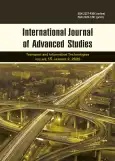Problems of the introduction of passenger electric vehicles in the Krasnodar territory
- Authors: Izyumsky A.A.1, Kotenkova I.N.1, Nadiryan S..1
-
Affiliations:
- Kuban State Technological University
- Issue: Vol 15, No 2 (2025)
- Pages: 217-228
- Section: Articles
- Published: 30.06.2025
- URL: https://bakhtiniada.ru/2328-1391/article/view/299345
- DOI: https://doi.org/10.12731/2227-930X-2025-15-2-368
- EDN: https://elibrary.ru/CRZFNC
- ID: 299345
Cite item
Full Text
Abstract
Background. In this article, the authors consider the transition of passenger electric vehicles from internal combustion engines to cars that use electric motors partially or completely for movement, and also consider the problems that arise along this path using the example of the Krasnodar Territory as one of the regions most suitable for this transition.
The article provides an analysis of the pace of development of the infrastructure necessary for the development of passenger electric transport in Russia and the Krasnodar Territory, assesses the current situation in the field of "electrification" of light vehicles, highlights the main problems that arise in this area, and outlines ways to solve them.
The authors propose to carry out this transition not simultaneously and everywhere, timing it to certain dates, in accordance with certain fashion trends in the field of motor transport, but consistently and steadily, but taking into account the experience of other countries and their own specifics, in relation to each region of Russia.
The authors provide recommendations for priority measures aimed at developing a passenger electric fleet and smoothing out problems with its implementation in relation to the Krasnodar Territory.
Purpose. Identification of the main problems related to the introduction of passenger electric vehicles in the Krasnodar Territory.
Materials and methods. The article used statistical analysis.
Results. The analysis of the passenger electric fleet and the infrastructure necessary for its operation in the Krasnodar Territory was carried out, the problems arising on the way of introduction of passenger electric vehicles were studied and recommendations for an early and painless transition to electric vehicles were proposed.
Scope of application of the results: scientific and research activities aimed at the early introduction of environmentally friendly vehicles.
About the authors
Alexander A. Izyumsky
Kuban State Technological University
Email: kopidd@mail.ru
Candidate of Technical Sciences, Associate Professor of the Department of Transport Processes and Technological Complexes
Russian Federation, 2, Moskovskaya Str., Krasnodar, Krasnodar Territory, 350072, Russian FederationIrina N. Kotenkova
Kuban State Technological University
Email: ir-kot83@mail.ru
Senior Lecturer at the Department of Transport Processes and Technological Complexes
Russian Federation, 2, Moskovskaya Str., Krasnodar, Krasnodar Territory, 350072, Russian FederationSofia L. Nadiryan
Kuban State Technological University
Author for correspondence.
Email: sofi008008@yandex.ru
Candidate of Technical Sciences, Senior Lecturer at the Department of Transport Processes and Technological Complexes
Russian Federation, 2, Moskovskaya Str., Krasnodar, Krasnodar Territory, 350072, Russian FederationReferences
- Decree of the Government of the Russian Federation. (2021). On approval of the concept for the development of production and use of electric vehicles in the Russian Federation for the period up to 2030 (as amended on October 29, 2022). Decree No. 2290-r. Retrieved from https://www.consultant.ru/document/cons_doc_LAW_393496/2cc3e7a044fad83b4255225febe023d7c743e4a0 (accessed: August 23, 2021).
- Dryuchin, D. A., Konovalova, T. V., Nadiryan, S. L., Kotenkova, I. N., & Rassokha, V. I. (2024). Role of public transportation in shaping the social sphere of urban territories. Science. Engineering. Technologies. Polytechnic Herald, (2), 29–32. EDN: https://elibrary.ru/AXFXLP
- Dryuchin, D. A., Konovalova, T. V., Lebedev, E. A., Nadiryan, S. L., & Rassokha, V. I. (2024). Optimization of the number of vehicles serving regular routes in urban agglomerations (monograph). Krasnodar: Izd. Dom Yug. 178 p.
- Konovalova, T. V., Nadiryan, S. L., & Kotenkova, I. N. (2024). Organization of transportation services and traffic safety: textbook. Krasnodar: Izd. KubGTU. 256 p. EDN: https://elibrary.ru/SZMALB
- Konovalova, T. V., Senin, I. S., Nadiryan, S. L., & Kotenkova, I. N. (2023). Analysis of transport problems in large and megacities. International Journal of Advanced Studies, 13(1), 126–136. https://doi.org/10.12731/2227-930X-2023-13-1-126-136 EDN: https://elibrary.ru/NDTHLQ
- Konovalova, T. V., Nadiryan, S. L., Mironova, M. P., & Litvinov, A. E. (2021). Optimization of pedestrian traffic in residential areas of large cities. IOP Conference Series: Materials Science and Engineering, 1159(1), 012019. https://doi.org/10.1088/1757-899x/1159/1/012019 EDN: https://elibrary.ru/PYVXAH
- Balaev, E. Y., Konovalova, T. V., Litvinov, A. E., et al. (2021). Statistical means of the assessment of the passive safety of road vehicles. IOP Conference Series: Materials Science and Engineering, 1159(1), 012098. https://doi.org/10.1088/1757-899x/1159/1/012098 EDN: https://elibrary.ru/PKLFGG
- Safronov, E., & Safronov, K. (2004). Beginning of reforming public transport—Improvement of route networks in cities. Automotive Transport, (5), 57–58. EDN: https://elibrary.ru/UPZLBM
- Syl'yanov, V. V. (1977). Traffic flow theory in road design and traffic organization. Moscow: Transport. 304 p.
- Yakimov, M. R. (2008). Transport systems of large cities: analysis of operating regimes in the city of Perm (monograph). Perm: Izd-vo Permsk. gos. tekhn. un-ta. 184 p. EDN: https://elibrary.ru/QDCXAS
Supplementary files










